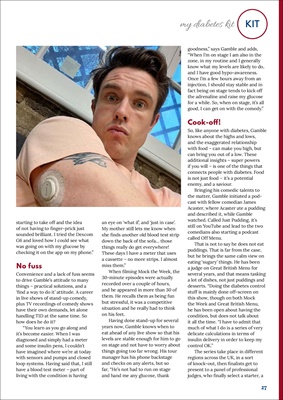
27
KIT
my diabetes kit
starting to take off and the idea
of not having to finger-prick just
sounded brilliant. I tried the Dexcom
G6 and loved how I could see what
was going on with my glucose by
checking it on the app on my phone."
No fuss
Convenience and a lack of fuss seems
to drive Gamble's attitude to many
things - practical solutions, and a
'find a way to do it' attitude. A career
in live shows of stand-up comedy,
plus TV recordings of comedy shows
have their own demands, let alone
handling T1D at the same time. So
how does he do it?
"You learn as you go along and
it's become easier. When I was
diagnosed and simply had a meter
and some insulin pens, I couldn't
have imagined where we're at today
with sensors and pumps and closed
loop systems. Having said that, I still
have a blood test meter - part of
living with the condition is having
an eye on 'what if', and 'just in case'.
My mother still lets me know when
she finds another old blood test strip
down the back of the sofa… those
things really do get everywhere!
These days I have a meter that uses
a cassette - no more strips. I almost
miss them."
When filming Mock the Week, the
30-minute episodes were actually
recorded over a couple of hours,
and he appeared in more than 30 of
them. He recalls them as being fun
but stressful, it was a competitive
situation and he really had to think
on his feet.
Having done stand-up for several
years now, Gamble knows when to
eat ahead of any live show so that his
levels are stable enough for him to go
on stage and not have to worry about
things going too far wrong. His tour
manager has his phone backstage
and checks on any alerts, but so
far, "He's not had to run on stage
and hand me any glucose, thank
goodness," says Gamble and adds,
"When I'm on stage I am also in the
zone, in my routine and I generally
know what my levels are likely to do,
and I have good hypo-awareness.
Once I'm a few hours away from an
injection, I should stay stable and in
fact being on stage tends to kick off
the adrenaline and raise my glucose
for a while. So, when on stage, it's all
good, I can get on with the comedy."
Cook-off!
So, like anyone with diabetes, Gamble
knows about the highs and lows,
and the exaggerated relationship
with food - can make you high, but
can bring you out of a low. These
additional insights - super powers
if you will - is one of the things that
connects people with diabetes. Food
is not just food - it's a potential
enemy, and a saviour.
Bringing his comedic talents to
the matter, Gamble initiated a podcast
with fellow comedian James
Acaster, where Acaster ate a pudding
and described it, while Gamble
watched. Called Just Pudding, it's
still on YouTube and lead to the two
comedians also starting a podcast
called Off Menu.
That is not to say he does not eat
puddings. That is far from the case,
but he brings the same calm view on
eating 'sugary' things. He has been
a judge on Great British Menu for
several years, and that means tasking
a lot of dishes, not just puddings and
desserts. "Doing the diabetes control
stuff is mainly done off-screen on
this show, though on both Mock
the Week and Great British Menu,
he has been open about having the
condition, but does not talk about
it all the time. "I have to admit that
much of what I do is a series of very
delicate calculations in terms of
insulin delivery in order to keep my
control OK."
The series take place in different
regions across the UK, in a sort
of knock-out, then finalists get to
present to a panel of professional
judges, who finally select a starter, a
main and a dessert that represents a
quintessential British menu. As part
of the filming for that, Gamble has to
sample eight desserts in one day.
When out with friends or business
colleagues, Gamble does not stint
on having a pudding. But on a day
like that, he'll revert to having just a
spoonful or two of each of the sweet
treats in order to keep on top of his
glucose control.